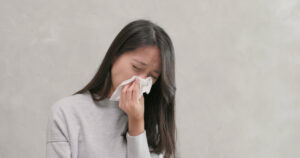May 09, 2022 | Black & Kletz Allergy

The diagnosis of hay fever relies on a comprehensive history and physical examination by a board certified allergist in conjunction with allergy testing by either allergy skin testing or allergy blood testing. This is done in order to identify allergies to specific allergens for each individual.
The treatment of hay fever involves avoiding the offending allergens if at all possible. Most of the time however, it is impossible to avoid the exposure to things like dust mites, molds, and pollens. When avoidance is either impossible or unhelpful, allergy medications are usually utilized in order to alleviate the annoying allergy symptoms. Allergy shots (i.e., allergy injections, allergy immunotherapy, allergy desensitization, allergy hyposensitization) are often implemented as a very effective way to combat allergies and asthma. Allergy shots are 80-85% effective and are generally taken for 3-5 years.
Not all individuals with allergy symptoms however are actually “allergic.” These individuals will have negative allergy skin tests or blood tests. If this occurs, the person is said to have non-allergic rhinitis or vasomotor rhinitis. They typically can have the same symptoms as someone with hay fever except they usually do not have itching of the nose, throat, or eyes.
The symptoms in individuals with non-allergic rhinitis may have intermittent symptoms or they can be perennial in nature. The physiology of non-allergic rhinitis is enlargement of the blood vessels inside the nostrils and subsequent leakage of fluids into the surrounding tissues resulting in excessive mucus and swelling of the mucus membrane linings and nasal turbinates. The cause of non-allergic rhinitis is unknown.
The triggers of non-allergic rhinitis may include: environmental irritants (e.g., pollution, dust, smoke, strong odors, fumes, chemical sprays, colognes, perfumes, potpourri, temperature changes, changes in humidity, viral infections (e.g., common cold, influenza), hormonal changes (e.g., thyroid disease, pregnancy, menstruation, emotional or physical stress, sleep apnea, gastrointestinal esophageal reflux disease (GERD), alcohol, rhinitis medicamentosa (i.e., prolonged or overuse of over-the-counter decongestant nasal sprays such as Afrin or Neosynephrine), gustatory rhinitis (i.e., food-related runny nose caused by an overstimulation of the vagal nerve. It is triggered by eating any type of food, but most often by hot or spicy foods), and various medications [(e.g., ibuprofen, aspirin, certain blood pressure medications (e.g., beta-blockers, ACE inhibitors), antidepressants, sedatives, and oral contraceptives].
The diagnosis of vasomotor or non-allergic rhinitis is established when an individual has the classic symptoms of hay fever but has negative allergy skin tests or blood tests and there is no evidence of infection. It is a diagnosis of exclusion since there are no specific tests to diagnose non-allergic rhinitis. It is rather the lack of positive allergy tests that are needed to diagnose the condition.
The treatment of non-allergic rhinitis begins with avoiding any triggers that cause symptoms. If one cannot avoid the triggers, an over-the-counter or homemade saline solution may be helpful in alleviating symptoms. Corticosteroid nasal sprays may also be helpful in decreasing nasal congestion due to their anti-inflammatory actions. Anticholinergic and antihistamine nasal sprays are also helpful in diminishing nasal symptoms. Oral decongestants can be taken in order to decrease nasal congestion in individuals who do not have a contraindication to using them such as individuals with hypertension, pregnancy, etc.
Note: If left untreated treated, complications may arise in individuals with non-allergic rhinitis which may include nasal polyps, middle ear infections, sinus infections (i.e., sinusitis), lack of concentration, poor school performance, and/or decreased productivity at work.
The board certified allergy doctors at Black & Kletz Allergy see both pediatric and adult patients and have over 5 decades of experience in the field of allergy, asthma, and immunology. Black & Kletz Allergy has 3 convenient locations with on-site parking located in Washington, DC, McLean, VA (Tysons Corner, VA), and Manassas, VA. The Washington, DC and McLean, VA offices are Metro accessible and we offer a free shuttle that runs between the McLean, VA office and the Spring Hill metro station on the silver line. To schedule an appointment, please call any of our offices or you may click Request an Appointment and we will respond within 24 hours by the next business day. We have been providing first-rate allergy and asthma care in the greater Washington, DC metropolitan area for over 50 years and we look forward to continuing to provide you with the highest state-of-the-art allergy care in a friendly and relaxed environment












